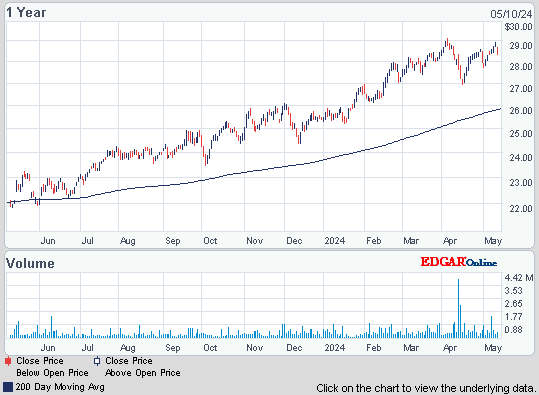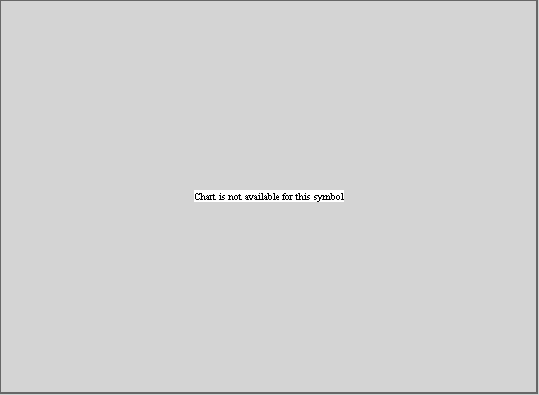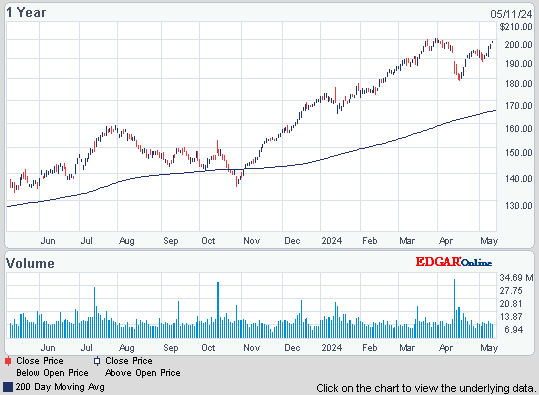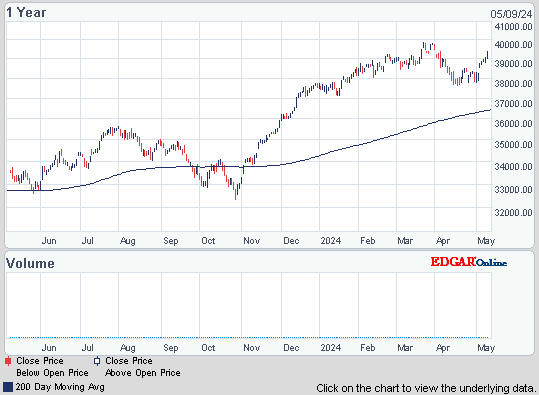Dow sank another 73 (closing at the lows), decliners over advancers almost 4-1 & NAZ fell 9 The Facebook IPO should have given the market a lift, but it didn't. Bank stocks continue to sell off, taking the Financial Index down 2 to the 183s (last seen 4 months ago).
The Alerian MLP Index plunged a whopping 9+ to the 363s (one of its biggest daily losses in history) & the REIT index lost 3 to the 242s. The MLP index has fallen about 50 from the record reached earlier in this year & is down about 30 in May. Junk bond funds were higher & Treasuries remain in demand with the yield on the 10 year Treasury at a record low of 1.7%. Oil continued on its losing ways but gold rose to a one-week high on renewed speculation that the Federal Reserve will announce additional stimulus to boost the US economy, increasing demand for the precious metal as an inflation hedge.

![Live 24 hours gold chart [Kitco Inc.]](http://www.kitco.com/images/live/gold.gif)


Photo: Bloomberg
Facebook (FB) shares rose less than expected on their first day of trade & huge order volume caused technical problems that marred the coming out party of the #1 online social network. Early gains of a few dollars were below market forecasts of as much as a 50% jump. FB, with 900M users, priced its IPO at the top end of its target range, becoming the first US company to go public with a valuation greater than $100B. If a greenshoe option to underwriters is exercised, FB will raise up to $18.4B by selling an 18% stake, the 2nd-biggest IPO in history (after the one by Visa (V)). The poorer-than-expected first-day showing was blamed on the vast number of shares floated & market weakness. General Motors' (GM) decision to pull paid-advertising from the social network, announced this week, also hurt. After a delay in the opening that drove up anxiety levels among traders & onlookers, the closely watched stock began trading at $42.05, rose to as high as $45 & then rapidly retreated. Nasdaq is investigating an issue with execution of trades. The IPO had been heavily oversubscribed, particularly by retail investors, despite concerns about slowing growth in the last qtr, whether the company can make money from mobile advertising, & the immense control CEO Mark Zuckerberg has over on the company. The stock closed at $38.23, slightly above the IPO price.

Chaos in Greek politics & Spanish banking combined this week to underscore just how fragile Europe's economy remains after an austerity regime that has spawned unemployment, desperation & misery. There is no respite in sight, as Germany's finance minister, Wolfgang Shaeuble, predicted that the crisis could last up to another 2 years. He holds the region's purse strings, chastized the leaders of the world's biggest economies as they headed to DC for a weekend summit to fix the Euro debt mess. The leaders, he said, "must show that Europe can achieve common positions more quickly." But common positions have been in short supply. After more than a week trying to form a gov, Greek politicians gave up this week & called another vote for June. Spain was forced to deny that a troubled bank faced a run on its deposits, then saw a major ratings agency downgrade 16 of its lenders & 4 of its semi-autonomous regions, similar to US states. Today, Spain's central bank announced that the level of bad loans on the books of Spanish banks, burdened by a rising tide of bad loans, recession and the highest unemployment rate in the eurozone, is at an 18-year high, fueling concerns about the financial sector in the Europe's 4th-largest economy. European countries are straining under high borrowing rates. The rates have risen as investors are nervous about gov debt loads. Under pressure from Germany, Europe's strongest economy, govs have laid off workers, cut pay for others, reduced spending on social programs & imposed higher taxes & fees to boost revenue. Don't expect magic to come from this meeting over the weekend.
Greek politics, Spain banks test eurozone survival AP

Photo: Bloomberg
JPMorgan , a Dow stock, loss from derivatives trading may widen to $5B according to the Wall Street Journal. CEO Dimon personally approved the strategy that led to the trades, without monitoring how they were executed, the newspaper said, & his failure to closely regulate that activity caused resentment among executives whose departments face tighter oversight. JPM last week announced a $2 B trading loss on synthetic credit products, or derivatives tied to credit performance. Dimon said the transactions, intended to manage risk, were “egregious” failures by the bank’s chief investment office. But now it says that the amount could increase by $1B or more as it winds down the positions. In a separate article, the WSJ, reported that the largest US lender by assets didn’t have a treasurer during the 5 months when the trades took place. The loss has prompted the Federal Reserve Bank of New York to examine how banks in its district are managing cash after receiving a flood of deposits since the credit crisis. Dimon has agreed to testify before a Senate committee that’s debating whether to tighten rules on trading by US lenders. This story keeps getting uglier & begs the question, "What other banks have these kind of problems?" The stock fell 44¢ & has fallen $13 in less than 2 months.

Stocks fell with the NYSE composite stock index turning negative YTD as FB stumbled in its market debut & investors were cautious ahead of a G8 summit on the weekend expected to address Europe's debt crisis. This week Dow lost 450, qualifying as a very ugly week. The Greek debt mess will drone on for another month, at a minimum, & the Spanish mess is going from bad to worse. Gloomy conditions in the markets will be around for some time .

The Alerian MLP Index plunged a whopping 9+ to the 363s (one of its biggest daily losses in history) & the REIT index lost 3 to the 242s. The MLP index has fallen about 50 from the record reached earlier in this year & is down about 30 in May. Junk bond funds were higher & Treasuries remain in demand with the yield on the 10 year Treasury at a record low of 1.7%. Oil continued on its losing ways but gold rose to a one-week high on renewed speculation that the Federal Reserve will announce additional stimulus to boost the US economy, increasing demand for the precious metal as an inflation hedge.
JPMorgan Chase Capital XVI (AMJ)
Click below for the latest market update:
Treasury yields:
U.S. 3-month | 0.081% | |
U.S. 2-year | 0.290% | |
U.S. 10-year | 1.700% |
| CLM12.NYM | ...Crude Oil Jun 12 | ...91.57 | ... | (1.1%) |
![Live 24 hours gold chart [Kitco Inc.]](http://www.kitco.com/images/live/gold.gif)


Photo: Bloomberg
Facebook (FB) shares rose less than expected on their first day of trade & huge order volume caused technical problems that marred the coming out party of the #1 online social network. Early gains of a few dollars were below market forecasts of as much as a 50% jump. FB, with 900M users, priced its IPO at the top end of its target range, becoming the first US company to go public with a valuation greater than $100B. If a greenshoe option to underwriters is exercised, FB will raise up to $18.4B by selling an 18% stake, the 2nd-biggest IPO in history (after the one by Visa (V)). The poorer-than-expected first-day showing was blamed on the vast number of shares floated & market weakness. General Motors' (GM) decision to pull paid-advertising from the social network, announced this week, also hurt. After a delay in the opening that drove up anxiety levels among traders & onlookers, the closely watched stock began trading at $42.05, rose to as high as $45 & then rapidly retreated. Nasdaq is investigating an issue with execution of trades. The IPO had been heavily oversubscribed, particularly by retail investors, despite concerns about slowing growth in the last qtr, whether the company can make money from mobile advertising, & the immense control CEO Mark Zuckerberg has over on the company. The stock closed at $38.23, slightly above the IPO price.
Facebook, Inc. (FB)
Chaos in Greek politics & Spanish banking combined this week to underscore just how fragile Europe's economy remains after an austerity regime that has spawned unemployment, desperation & misery. There is no respite in sight, as Germany's finance minister, Wolfgang Shaeuble, predicted that the crisis could last up to another 2 years. He holds the region's purse strings, chastized the leaders of the world's biggest economies as they headed to DC for a weekend summit to fix the Euro debt mess. The leaders, he said, "must show that Europe can achieve common positions more quickly." But common positions have been in short supply. After more than a week trying to form a gov, Greek politicians gave up this week & called another vote for June. Spain was forced to deny that a troubled bank faced a run on its deposits, then saw a major ratings agency downgrade 16 of its lenders & 4 of its semi-autonomous regions, similar to US states. Today, Spain's central bank announced that the level of bad loans on the books of Spanish banks, burdened by a rising tide of bad loans, recession and the highest unemployment rate in the eurozone, is at an 18-year high, fueling concerns about the financial sector in the Europe's 4th-largest economy. European countries are straining under high borrowing rates. The rates have risen as investors are nervous about gov debt loads. Under pressure from Germany, Europe's strongest economy, govs have laid off workers, cut pay for others, reduced spending on social programs & imposed higher taxes & fees to boost revenue. Don't expect magic to come from this meeting over the weekend.
Greek politics, Spain banks test eurozone survival AP

JPMorgan , a Dow stock, loss from derivatives trading may widen to $5B according to the Wall Street Journal. CEO Dimon personally approved the strategy that led to the trades, without monitoring how they were executed, the newspaper said, & his failure to closely regulate that activity caused resentment among executives whose departments face tighter oversight. JPM last week announced a $2 B trading loss on synthetic credit products, or derivatives tied to credit performance. Dimon said the transactions, intended to manage risk, were “egregious” failures by the bank’s chief investment office. But now it says that the amount could increase by $1B or more as it winds down the positions. In a separate article, the WSJ, reported that the largest US lender by assets didn’t have a treasurer during the 5 months when the trades took place. The loss has prompted the Federal Reserve Bank of New York to examine how banks in its district are managing cash after receiving a flood of deposits since the credit crisis. Dimon has agreed to testify before a Senate committee that’s debating whether to tighten rules on trading by US lenders. This story keeps getting uglier & begs the question, "What other banks have these kind of problems?" The stock fell 44¢ & has fallen $13 in less than 2 months.
J P Morgan Chase & Co (JPM)
Stocks fell with the NYSE composite stock index turning negative YTD as FB stumbled in its market debut & investors were cautious ahead of a G8 summit on the weekend expected to address Europe's debt crisis. This week Dow lost 450, qualifying as a very ugly week. The Greek debt mess will drone on for another month, at a minimum, & the Spanish mess is going from bad to worse. Gloomy conditions in the markets will be around for some time .
Dow Industrials
Get your favorite symbols' Trend Analysis TODAY!


No comments:
Post a Comment